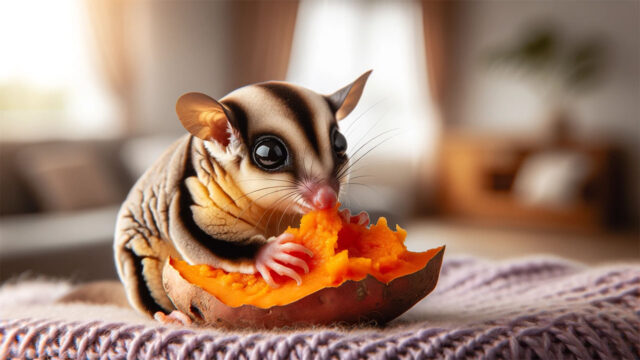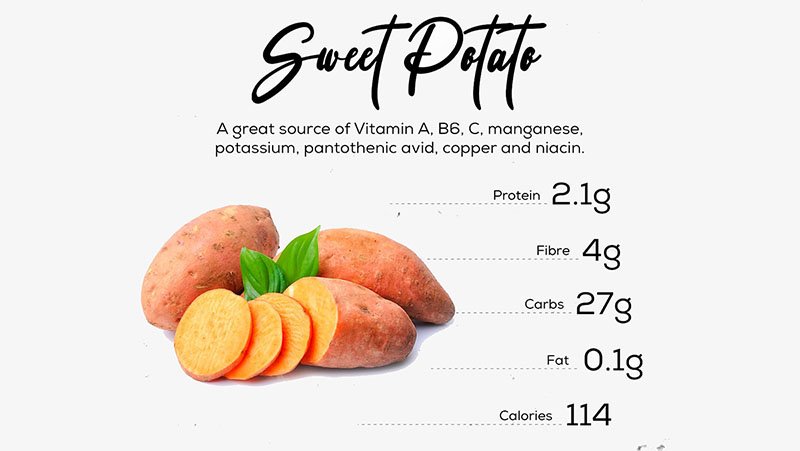
Sugar gliders, the small, adorable marsupials native to Australia, Papua New Guinea, and Indonesia, have stolen the hearts of many pet enthusiasts. Their playful nature and unique characteristics make them fascinating companions. However, caring for sugar gliders requires specific knowledge, especially when it comes to their diet. A common question that arises among sugar glider owners is, “Can sugar gliders eat sweet potatoes?” This article delves into the nutritional value of sweet potatoes and their role in the diet of sugar gliders.
Table of Contents
Nutritional Profile of Sweet Potatoes
Sweet potatoes are renowned for their high nutritional value. They are an excellent source of dietary fiber, vitamins, and minerals. Key nutrients include vitamin A (in the form of beta-carotene), vitamin C, manganese, and several other vitamins and minerals. These components make sweet potatoes nutritious for humans and potentially beneficial for pets, including sugar gliders.
Here’s a table showing the nutrient values of sweet potatoes, particularly focusing on the nutrients that are relevant to a sugar glider’s diet:
| Nutrient | Amount per 100g of Sweet Potato | Benefit for Sugar Gliders |
|---|---|---|
| Calories | 86 kcal | Energy source |
| Water | 77 g | Hydration |
| Protein | 1.6 g | Muscle growth and repair |
| Carbohydrates | 20.1 g | Primary energy source |
| Dietary Fiber | 3 g | Digestive health |
| Sugar | 4.2 g | Natural sweetness |
| Vitamin A | 709 μg (RAE) | Eye health, skin, and coat health |
| Vitamin C | 2.4 mg | Immune system support |
| Calcium | 30 mg | Bone health |
| Iron | 0.6 mg | Blood health |
| Magnesium | 25 mg | Nerve and muscle function |
| Phosphorus | 47 mg | Bone health |
| Potassium | 337 mg | Heart and muscle function |
| Sodium | 55 mg | Electrolyte balance |
| Zinc | 0.3 mg | Immune health |
| Beta-carotene | 8509 μg | Antioxidant properties |
Can Sugar Gliders Eat Sweet Potatoes?
Sugar gliders are cute little pets that need special care when it comes to their diet. People often wonder if sugar gliders eat sweet potatoes. Yes, sugar gliders can eat sweet potatoes but not raw. Sweet potatoes are good for them because they have lots of vitamins, like Vitamin A and C, and they’re good for their digestion too. But it’s important to remember that sweet potatoes should only be a small part of what they eat.
When you give sweet potatoes to your sugar glider, make sure you cook them first. You can boil or bake them but don’t add any salt or spices. Also, give them only a little bit.
Sweet potatoes should not be the only thing they eat. Sugar gliders also need other fruits, veggies, and some protein, like bugs. If you’re thinking about adding sweet potatoes to your sugar glider’s diet, it’s a good idea to talk to a vet who knows about sugar gliders. They can give you the best advice on what to feed your furry friend.
Benefits of Sweet Potatoes in a Sugar Glider’s Diet

Sweet potatoes can offer several health benefits to sugar gliders:
- Vitamin A: Essential for maintaining healthy skin, coat, and eyes.
- Dietary Fiber: Aids in digestion and helps prevent constipation.
- Antioxidants: Help to boost the immune system.
Including sweet potatoes in their diet can contribute to sugar gliders’ overall health and well-being.
How to Prepare and Serve Sweet Potatoes to Sugar Gliders
To safely incorporate sweet potatoes into your sugar glider’s diet, follow these steps:
- Choose Organic: Opt for organic sweet potatoes to avoid pesticide residue.
- Wash Thoroughly: Clean the sweet potatoes to remove any dirt or contaminants.
- Cook Properly: Boil or bake the sweet potatoes without adding salt, sugar, or spices.
- Mash or Dice: Once cooked, mash or dice them into small, manageable pieces for your sugar glider.
- Cool Before Serving: Ensure the sweet potatoes are cool enough to prevent burning.
Recommended Portion Sizes and Frequency of Sweet Potatoes
Moderation is key when feeding sweet potatoes to sugar gliders. They should only be a small part of the diet, complementing a balanced intake of fruits, vegetables, and protein sources. A teaspoon-sized serving once or twice a week is sufficient. Overfeeding can lead to obesity and nutritional imbalances.
Foods to Avoid in a Sugar Glider’s Diet
While sweet potatoes are safe, some foods are not and should be avoided, including:
- Chocolate and Caffeine: Toxic to sugar gliders.
- Onions and Garlic: This can be harmful in large quantities.
- Fatty Foods: This can lead to health issues like obesity.
- Dairy Products: Sugar gliders are lactose intolerant.
FAQs – Frequently Asked Questions
Can sugar gliders eat raw sweet potatoes?
No, sugar gliders should not eat raw sweet potatoes as they can be hard to digest. Always cook them before feeding.
How often can I feed my sugar glider sweet potatoes?
Once or twice a week in small amounts is ideal for sugar gliders.
Are there any alternatives to sweet potatoes for sugar gliders?
Yes, other safe vegetables include peas, carrots, and squash.
Are Sweet Potatoes Safe for Sugar Gliders?
Fortunately, sweet potatoes are generally safe for sugar gliders when prepared properly and given in moderation. They do not contain any toxic substances that could harm sugar gliders. However, it’s crucial to understand how to serve them correctly.
Conclusion
Sweet potatoes, when prepared properly and fed in moderation, can be a healthy addition to a sugar glider’s diet. They provide essential nutrients that can contribute to the overall health of these delightful pets. However, it’s crucial to balance their diet with a variety of other fruits, vegetables, and protein sources.
For any specific dietary needs or concerns, always consult with a veterinarian specializing in exotic pets. Share your experiences or questions about feeding sweet potatoes to sugar gliders in the comments below. Your insights could be beneficial to fellow sugar glider owners!









